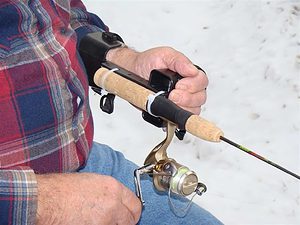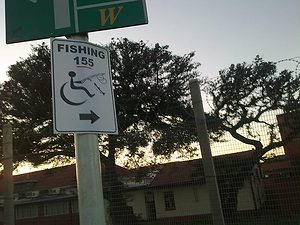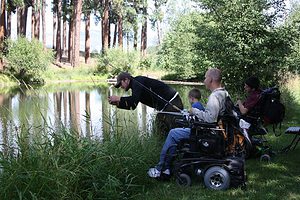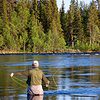Disclosure: Some posts contain affiliate links, which earn us a commission if you make a purchase through them. Positive Fishing © participates in various affiliate networks including the Amazon Services LLC Associates Program.
Fishing has become one of the top pastimes for people worldwide, but how do the fishing community and industry help those anglers with disabilities?
Thankfully, many states and local communities have stepped up to help make fishing much easier with much better access to ramps for wheelchairs, specially groomed trails, and larger fishing platforms.
The fishing manufacturers have also developed new aids and specialized equipment to help disabled anglers.
Further efforts are still required to improve many aspects to help the disabled angler, but with increased awareness, more will have the chance to wet a line!
In this article, I will cover the following:
- Where To Find Local Information on Fishing with Disabilities
- License Information For The Disabled
- Local Accessibility Information
- Disabled Fishing Web Resources
- Adaptive Fishing Equipment
- How To Find Fishing Disability Groups
- Accessible Fishing Spots For The Disabled
- How To Help The Fishing Disability Community
- Final Thoughts
Where to Find Local Information on Fishing with Disabilities?
Depending on where you live, information for those who have disabilities and would like to fish can be easy or challenging to find. You can find what you need with research, but it may take effort.
Do Disabled Anglers Need A License?
Certain states within the United States don’t require those with diagnosed disabilities to purchase a disability fishing license. California is the leading proponent of this rule, but other states are starting to follow suit. However, most states still require disabled people to purchase a fishing license.
In most US states, an unlicensed person may assist a disabled angler with a disability license.
You should be able to find a section on the license page that describes any exceptions to the rules. Below is a summary of the 50 US states:
- 6 States offer exemptions for fishing licenses for the blind only.
- 7 out of 50 states have no exemptions or discounts for fishing licenses for anglers with disabilities.
- 21 of the 50 states offer exemptions (some are limited) for anglers with a disability.
- Only 16 of the 50 states offer discounted fishing licenses for disabled anglers.
Note: The information within this article is subject to change and is applicable at the time this article was written. State governments can often change the regulations and requirements over time.
It should also be noted that to apply and qualify for certain discounts or a free license, the majority of states have strict eligibility criteria during the application, including proof of disability.
Some states may only offer a free fishing license for the disabled, covering a specific number of years, while some will provide a lifetime license.
Always refer to the official state license websites to understand the most recent status and application forms. If you visit a local license dealer, they may not know the exact regulations.
Please refer to the following table for each state’s status.
| State | Status For The Disabled | Where To Purchase |
|---|---|---|
| Alabama | Discounted Rate | Alabama Fishing License |
| Alaska | None | Alaska Fishing License |
| Arizona | Blind Exempted Only | Arizona Fishing License |
| Arkansas | Discounted Rate | Arkanasas Fishing License |
| California | Exempted | California Fishing License |
| Colorado | Exempted | Colorado Fishing License |
| Connecticut | Exempted | Connecticut Fishing License |
| Delaware | None | Delaware Fishing License |
| Florida | Exempted | Florida Fishing License |
| Georgia | Discounted Rate | Georgia Fishing License |
| Hawaii | Exempted | Hawaii Fishing License |
| Idaho | Discounted Rate | Idaho Fishing License |
| Illinois | Exempted | Illinois Fishing License |
| Indiana | None | Indiana Fishing License |
| Iowa | Exempted | Iowa Fishing License |
| Kansas | None | Kansas Fishing License |
| Kentucky | Discounted Rate | Kentucky Fishing License |
| Louisiana | Exempted | Louisiana Fishing License |
| Maine | Exempted | Maine Fishing License |
| Maryland | Blind Exempted Only | Maryland Fishing License |
| Massachusetts | Exempted | Massachusetts Fishing License |
| Michigan | None | Michigan Fishing License |
| Minnesota | Exempted | Minnesota Fishing License |
| Mississippi | Exempted | Mississippi Fishing License |
| Missouri | Exempted | Missouri Fishing License |
| Montana | Discounted Rate | Montana Fishing License |
| Nebraska | Discounted Rate | Nebraska Fishing License |
| Nevada | Discounted Rate | Nevada Fishing License |
| New Hampshire | Discounted Rate | New Hampshire Fishing License |
| New Jersey | Blind Exempted Only | New Jersey Fishing License |
| New Mexico | Discounted Rate | New Mexico Fishing License |
| New York | Blind Exempted Only | New York Fishing License |
| North Carolina | Blind Exempted Only | North Carolina Fishing Lisense |
| North Dakota | Discounted Rate | North Dakota Fishing Lisense |
| Ohio | Exempted | Ohio Fishing License |
| Oklahoma | Exempted | Oklahoma Fishing License |
| Oregon | None | Orengon Fishing License |
| Pennsylvania | None | Pennsylvania Fishing License |
| Rhode Island | Exempted | Rhode Island Fishing License |
| South Carolina | Exempted | South Carolina Fishing License |
| South Dakota | Discounted Rate | South Dakota Fishing License |
| Tennessee | Discounted Rate | Tennessee Fishing License |
| Texas | Exempted | Texas Fishing License |
| Utah | Exempted | Utah Fishing License |
| Vermont | Exempted | Vermont Fishing License |
| Virginia | Blind Exempted Only | Virginia Fishing License |
| Washington | Discounted Rate | Washington Fishing License |
| West Virginia | Exempted | West Virginia Fishing License |
| Wisconsin | Discounted Rate | Wisconsin Fishing License |
| Wyoming | Discounted Rate | Wyoming Fishing License |
Local Accessibility Information
Any local Parks Department will be able to give you any necessary information on accessible fishing points. Unfortunately, most sites have little or no information, and their website isn’t going to have everything perfectly up to date, so visit the parks department or make some phone calls.
If you have access to a state park close by, their respective website should have all the information you need about accessible portions of lakes and rivers. Usually, these are fairly up-to-date and will change if new trails are added.
Obviously, all the National Park websites will have the most detailed and up-to-date of all park websites regarding accessibility.
Visitor centers and Facebook pages are other places to visit if you cannot find the information you need. Sadly, you will have to search more to determine what areas are more friendly to others regarding disabilities.
Where To Find Disabled Fishing Web Resources?
Fishing Has No Boundaries is a non-profit organization whose goal is to open up the great outdoors for people with disabilities through the world of fishing. The site has dozens of chapters in many towns and cities that anyone with disabilities can contact to learn more about fishing! You can be a member by following the link to their membership page.
British Disabled Angling Association is actively developing opportunities for disabled people of all ages and abilities to access fishing activity in the UK.
Some states, such as Oregon, have a great site for finding accessible fishing locations. Check out your specific state to find valuable updated information.
Anglers of Honor is a non-profit organization focusing on fly fishing for military veterans and other individuals with physical and mental disabilities and their families.
Another significant cause serving people with disabilities, particularly veterans, is Project Healing Waters, which is dedicated to helping disabled fly-fishing anglers. It’s a non-profit group that strives to encourage volunteers to engage in helping those less fortunate.
What Adaptive Fishing Equipment Can I Buy?

Thankfully, more and more companies are being founded to help those with disabilities improve their fishing abilities. These resolve the issues of accessing the water and allow disabled fishing to be something they love. It’s not easy for those who may have once been able to fish to eventually not be able to do so.
There are all sorts of companies that make handicapped fishing equipment. Below are a few of the well-known ones:
Rexfly supplies a good range of customized spinning and casting rods for anyone with only one arm when fighting large fish and who has a little trouble holding a rod.
Access to Recreation is another company based in California that helps those with disabilities learn more information about fishing. They also sell various accessories and suitable fishing wheelchairs for the disabled community.
Fishing Rod Harnesses And Mounts
Numerous companies manufacture adaptive rod holders that are designed for use if you have limited ability to hold a rod. Beadaptive.com is one of these great companies. The rod holders can attach to your wheelchair, a dock, or even a railing on a boat, depending on what you need them to do.
These special mounts will not cast for you, but you can reel and set the hook without picking the rod up out of the holder. They’re a nifty invention that allows you to do everything but make the cast! Whether you want to set the hook or reel with your right or left hand, there’s an option for you.
These harnesses and mounts are among the most popular disabled fishing equipment to buy as they address a major disability for anglers.
Electric Reels
Let’s say you can make your cast and set the hook but have limited mobility with your fingers and fine motor skills. In cases like this, electric reels are an excellent solution.
Whether you want to fish with a spin reel or baitcasting reel, there’s an option for you. Fish Winch is a great brand option, depending on your needs. These Fish Winch® electric fishing reel motors convert 289 different Penn, Shimano, Daiwa, Avet, and other manufacturers of reels into powerful electric reels. Many of the batteries installed in the electric reels are also rechargeable!
Reel Cranks
You can choose between a full electric reel and a regular reel if you have limited mobility.
Some devices are called reel cranks, which attach the reel’s handle to a glove you wear on your hand. This way, you don’t need your fingers to reel, but you can still use the mobility you have in your hands. It’s a great compromise that lets you do almost everything you need to fish.
Strong Arm Rod Holder
If you have movement in one arm but no grip strength and full movement in your other arm, the strong arm rod holder is a sweet piece of equipment.
The Strong arm holder attaches to your wrist and essentially grips the rod for you. You can make the casting motion and set the hook without gripping the rod. Your other hand can open the bail as well as do the reeling.
How To Find Fishing Disability Groups?
As mentioned above, several national groups have chapters across the United States for anglers with disabilities. That said, those organizations are not the only groups with options for disabled anglers!
Throughout Europe, several sites discuss fishing for disabled anglers and have a global reach. The UK fishing disabilities groups are very resourceful and have a good following.
With some searching skills and a bit of boldness, you’ll be able to find many sites for handicapped and anglers with disabilities.
Disabled Fishing Social Media Groups
Social Media can cause quite a bit of harm, but it can also greatly benefit someone searching for a community. Search on Facebook for disability groups in your city or county and see what appears.
Also, you can click on certain locations on Instagram and see the type of people who have been fishing in your local waters. Any person who tags the area in their pictures will appear, and you can get in contact that way.
Once you find a person or a group, reach out and see when and where they like to fish! This is a great way to meet people and find yourself in a great community.
Join a Facebook group such as the Disabled Angling – S.A.F.E. Suitable Accessible Angling For Everyone – this site is an excellent resourceful Facebook site.
Start A Fishing Disabilities Group On Your Own!
If you’re bold enough, starting your own fishing group for those with disabilities is a great chance to meet like-minded people.
You never know what can start out in setting up one of these groups. They’ll likely grow at a faster rate than you would think.
How To Find Accessible Fishing Spots For The Disabled?

the best fishing spots for the disabled angler.
One of the harder parts of fishing with disabilities is finding access to water that allows you to be comfortable and fish.
Use Google Maps
If you have the time and cannot find much information on accessible bodies of water, Google Maps can be your friend.
Search a local lake and river and turn on the satellite view. The satellite view will allow you to zoom in on the body of water and do some searching to determine what areas you can access. You may be able to find a pier or a public dock that you may not have otherwise been able to access.
Google Maps can locate wheelchair-accessible places; turn on the “Accessible Places” feature to have wheelchair accessibility information, such as fishing locations. You can learn more about how to find fishing locations with Google Maps which creates an easy and informative guide to help any angler to find the best places to fish.
Do Some Google Searching
You’ll be surprised at what you can find with a simple Google search. Search “accessible water in ____,” and you’ll likely find a decent amount of information to get you started.
Get Friends To Check Out Areas Before You Go
If you really cannot find information on accessible waters, it’s best to get a relative or friend out before you do some scouting around.
Most regional or local parks have at least one location accessible to people of all abilities. Whether you plan fishing along the banks or from a pier, you should have an opportunity to do some great fishing!
How To Help The Fishing Disability Community?

Everyone can help in making fishing for those with disabilities much easier. Many anglers are already doing their part in various forms. Some of the activities we all can volunteer some time to are as follows:
Building Platforms
Access from the car to the fishing spot tends to be troublesome, and tracks do not always have a flat, smooth path. Once anglers get to where they want to fish, the bankside area must be large enough, and it also helps that the spot is flat and with a platform.
Some platforms are made from wood sheets or can also have a concreted area. Double peg sizes 8 feet by 5 feet are ideal for wheelchairs or two people to fish together.
Work Parties
Angling clubs often hold work parties to clean the areas around the lake, making better space and cutting down branches that have overgrown the areas. Creating more room around the disabled anglers helps make fishing so much easier.
Final Thoughts
Fishing is a great sport, and for those disabled persons or those in the process of recovery, the benefit of fishing is a tremendous boost for many.
With more disabled fishing equipment available, angling has become much easier. Where possible, why not reach out and volunteer to help the physically challenged during their fishing experience?
I hope this was informative and helpful; you can learn more about non-profit and fishing charities’ work and how you can participate in these worthy causes.
- 5 Best Fishing Bags For Getting Your Gear Organized - January 13, 2025
- 4 Essential Surf Fishing Rigs - January 11, 2025
- How To Know The Sex Of A Fish You Have Caught? - December 9, 2024

